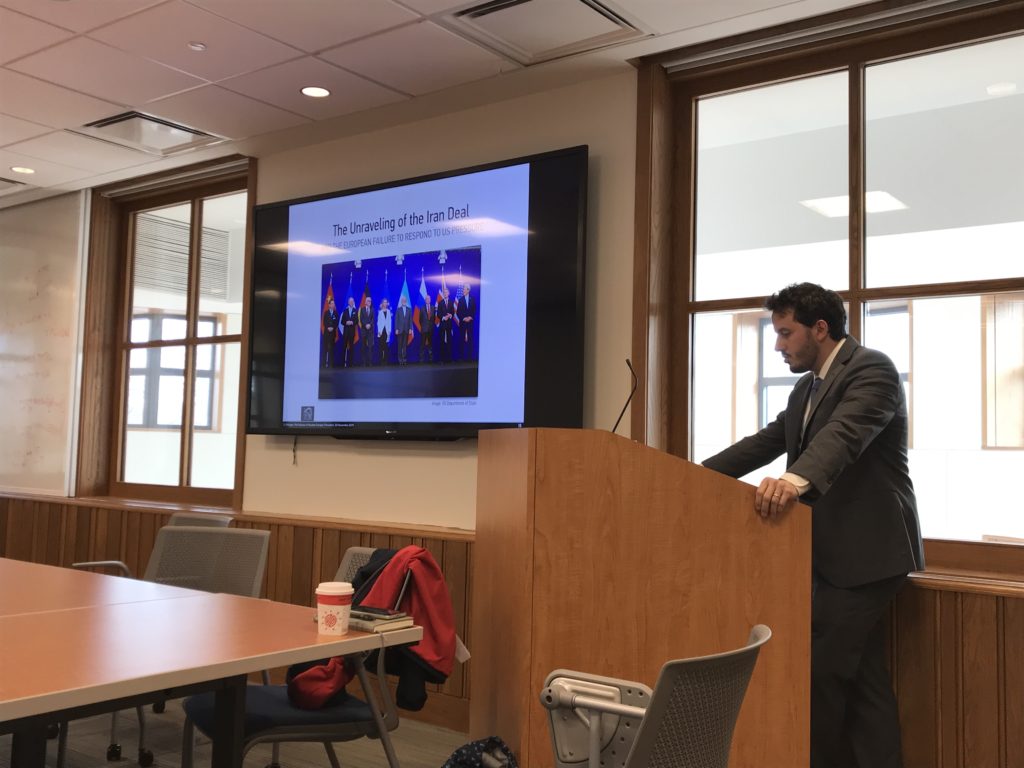Written by Lyubomir Hadjiyski
Dr. Sébastien Philippe is an Associate Research Scholar at the Woodrow Wilson School of Public and International Affairs where he is a core member of the Program on Science and Global Security. His research focuses on the negotiation, monitoring and verification of nuclear arms control and non-proliferation agreements, the reconstruction of past nuclear weapon activities, and the impact of emerging technologies on the safety, security, and vulnerability of strategic nuclear forces. Dr. Philippe spoke to students and scholars about the security challenges Europe faces –particularly in relation to nuclear weapons.

Two recent events on the international scene have caused European leaders to reevaluate their strategic security. In 2018, the United States withdrew from the Joint Comprehensive Plan of Action and imposed sanctions on companies–including European ones–who dealt with Iran. This year, the United States also withdrew from the Intermediate-Range Nuclear Forces Treaty with Russia, which was signed during the Cold War and banned the two countries from developing and deploying short- to medium-range nuclear warheads. With these two pillars of European nuclear security eroded, EU leaders have started to re-evaluate their perception of the United States as a predictable power dedicated to European security, and are beginning to seek alternative options.
We may be experiencing the “erosion and near collapse of arms control,” said Dr. Philippe in reference to recent US withdrawals from nuclear treaties.
Dr. Philippe laid out several scenarios for the future of European nuclear security. The first and most obvious is a “business as usual” scenario, whereby European countries continue relying on the US for their security, accept their inherent nuclear vulnerability, and rely on change in the current administration and its policy towards Europe in 2020.
The second option is what he calls “pursuing strategic autonomy,” which is also what French President Emmanuel Macron hinted at in his widely-circulated ‘The Economist’ interview in which he called the US-backed NATO security alliance “brain-dead.” What this option entails is building up joint military capabilities within the European Union, as opposed to NATO. Two EU members, France and Britain, possess a nuclear arsenal, but in a post-Brexit Europe, France will remain the only nuclear power. Strategic autonomy may mean that that French nuclear weapons will be stationed in EU member states and be shared by the bloc. This scenario, Dr. Philippe, says is currently unlikely due to three reasons: the French nuclear weapon is highly dependent on the United States’, such a deployment may have too little democratic legitimacy, and it is unclear who will foot this bill.
The third option is somewhere in between, but nonetheless involves re-evaluating the EU-US relationship. What is perhaps most worrying is that current US foreign policy and security decisions seem to be less of an anomaly connected to the current US President Donald Trump and more of a tendency among wider political circles. Regardless of where European security heads in the future, one thing is certain: EU citizens must be consulted, or else the bloc risks loosing even more of its democratic credibility.
